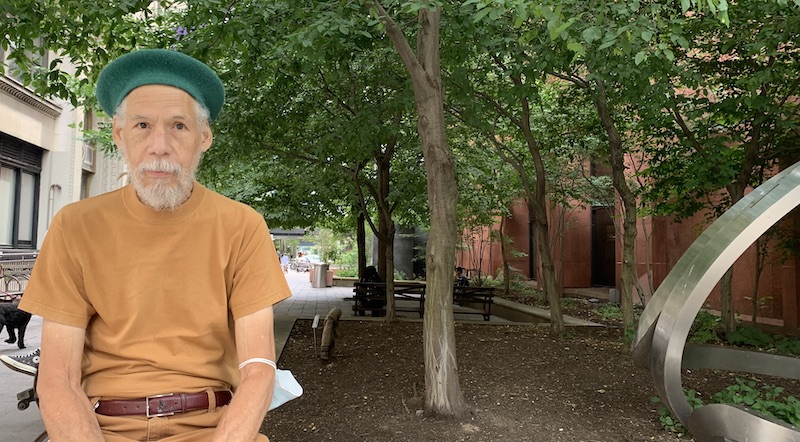Featured Articles
From selling weed to peddling roses
By Madison Kim
A white industrial bucket holds an assortment of fox tails, honeycombs and purple mists. Two green planters hold cat tails, daisies and pink panthers, wildflowers sourced from a friend’s farm in New Jersey. These things Martin Fritsche sells to NYU students and other steady customers.
“I’ve seen him around the area while going to class,” sophomore Michael Zlatnik said.
“I’ve never talked to him, but I bought flowers for a couple bucks,” junior Andrew Zuperman said. “He seems pretty nice.”
In summer, when most students are in their hometowns, sales get pretty low, down to about $40 a day. Yet, selling flowers is how Fritsche has made his money for almost two decades,
Those are the details of his story, shared one summer day as he sat under the refracted light and shade of the trees in Washington Square Park. Essential to that story, he said, was how, 19 years ago, when he was 50, he gave his life to the Lord. Two weeks ago, at age 69, the doctors detected cancer in his stomach. He does not know how much longer he has to live. Sometimes, while sitting on the concrete bench on the outskirts of Washington Square, he rests a copy of The New American Bible, tattered and worn, in his lap.
The last born of 11 children on the Caribbean island of St. Lucia, Fritsche grew up as the privileged son of a turtle farmer and nutmeg harvester. When his older siblings left the island for Great Britain, Sweden, Spain and the United States, Fritsche passed his time with his mother, watching her tend to the bougainvilleas, hibiscuses, anthuriums and asparagus ferns in their backyard. Seeing her on their plots of land, digging dirt and plucking parasitic slugs out of trees, made him appreciate her way of life.
He also appreciated his brother’s aesthetic when, in the 1970s, he came home to that island wearing the latest New York City fashion. So, he opened a boutique selling imported American clothing in St. Lucia, stocking it with “bell bottoms, high heels, pastel-color pants, cuffed pants and beautiful denim jeans.”
Years later, as that work began to bore and island life to suffocate him, he shut the boutique and all but moved into the trawler his father had used for turtling. He sailed. To Dominican Republic, to St. Vincent and the Grenadines, to Grenada, to St. Thomas.
When he got his girlfriend pregnant, his sailing stopped. He moved to be with her and the baby in Barbados, where he became what he says was the island’s No. 1 weed seller. That’s how he supported the mother of that first baby, then a second one.
But being a family man didn’t suit him. “The woman was choking me,” he said. “I was wrong, but I couldn’t be hypocritical in that way, to fake love.”
During that period of discontent, on a trip to New York. In Washington Park, he smelled a familiar smell. “‘Look, the rest is hanging out there,’” said the cousin he was visiting in the Big Apple, “‘smoking weed and selling weed. That’s your kind of life.’”
“That was in June of ‘83,” Fritshe said.
He sold and smoked weed in his adopted city until 2003, helped fight for its legalization, starting in the late 1980s to the 2000s. He gave up weed to sell flowers on the street.
While his existence today is a far cry from that lush living back on that island, he’d much rather live a straight life with little to his name than one of “fornicating with a thousand dollars in my pocket.”
Somehow, he traces that decision to go straight back to St. Lucia, where his parents took him to church. “They prayed me and present me to church,” he said, in broken English of that island, “taught me to confess my sins.”
If he could live his life over, he’d be a preacher, he said. “Serve the Lord, help the poor, help the sick. I want to do that off the bat.”
He wiped the sweat off his brows. “You don’t need money to go to heaven. You need good faith, clean work. That’s what it is. So I’m practicing and trying to get better before the Lord takes me off this Earth.”
While preaching, he’d still be selling flowers on the side. The Gerbera daisy — said to symbolize innocence, purity and love — is his favorite.
He used to own several houses and cars in the Caribbean. Now, he rooms with his sister in Queens. He has no phone, no friends, no lover. He reads the Bible. He feels no guilt.
The fact that he is alive makes him satisfied and grateful, he said, pondering his past and his future. “If they don’t confine me to a clinic or make me bedridden, I will be back here. Selling my flowers.”


